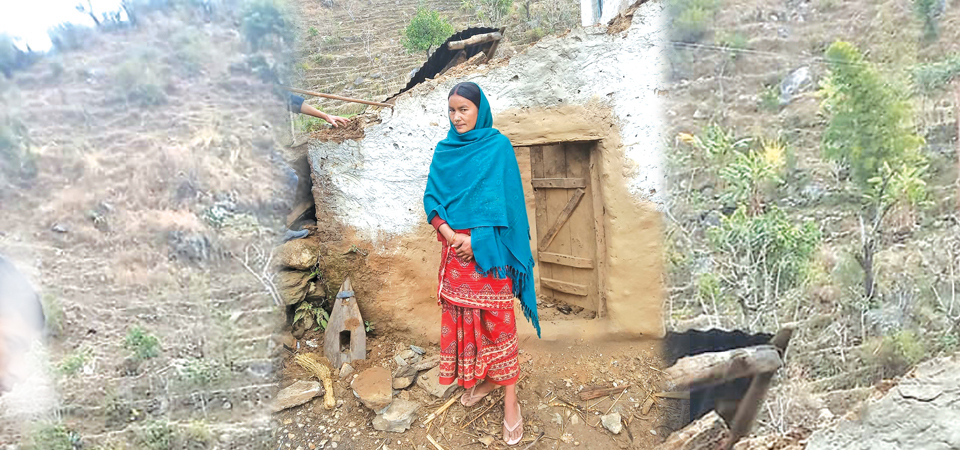Chhaupadi system continues in Bajura

By Sher Bahadur Sharki
Bajura, Dec. 7: In January 2019, Amba Bohora of Bajura and her two sons aged nine and 12 died after she was consigned to an outdoor shed during her period, because of a longstanding custom of Chhaupadi in the region that considers menstruating women impure.
Amba of Pandusen, Budhinanda Municipality-9, and her sons Suresh and Ramit choked to death in a windowless Chhaugoth (isolated makeshift shed). They died from smoke inhalation after they made a fire to stay warm.
This incident shocked and saddened the whole country. Following the incident, the Ministry of Home Affairs directed the District Administration Office of Bajura to take stricter measures to discourage the practice of Chhaupadi.
The Ministry also issued an eight-point circular to the local authorities of 19 Chhaupadi-prevalent districts to intensify the drive against the social ill.
As per the instruction of the Ministry, the District Administration Office (DAO), Bajura, started collecting data on menstrual huts in the district.
According to the District Police Office, there were a total of 511 menstrual huts. The district administration office intensified the drive against the malpractice and demolished the menstrual huts with the support of political leaders, local activists and the district police.
Earlier in 2015, the Supreme Court had banned Chhaupadi. In 2017, a new law criminalising Chhaupadi came into force.
However, destroying Chhaugoths has not helped people get rid of their misconception. Despite all the efforts, the superstition runs so deep in the region that many women there continue to practice it even to this day fearing God's wrath.
The practice is linked to Hindu beliefs which ban menstruating women and new mothers stay inside their homes but in a makeshift shed because they are believed to be impure and bring bad luck to the family.
During five days of their periods, they are not allowed to enter the home, touch anyone and are restricted from eating certain foods including dairy products.
Local women said the government’s campaign to demolish Chhaugoths has added woes to their lives. They are now forced to spend their nights under tarpaulin sheds during their periods. The locals of Budhinanda, Triveni and Kanda Jayabagyashwari are now reconstructing Chhaugoths. The local faith healers were found giving continuity to this practice citing that keeping menstruating women inside the house is a vice and results in poor breeding of cows and buffaloes.
Ramita Pari of Kundi, Budhinanda Municipality-1 said, “When the campaign intensified, locals allowed menstruating women to stay home. But once the campaign lost steam, they were again banished from home citing that keeping menstruating women at home would anger the deities.”
Pari said she was forced to stay in a makeshift hut again because her father-in-law claimed that their livestock fell sick because she stayed home during her periods. “I don’t want to hurt the feelings of my in-laws. That’s why I started staying in Chhaugoth again.”
Meena Budha, a local of Budhiganga Municipality-8, most of the women had started sleeping in makeshift sheds made out of tarpaulin after the shamans claimed that the villagers would face god’s wrath if they didn’t follow the tradition.
Parmita Rokaya of Khaptad, Chhededaha Rural Municipality-1, said that she was forced to sleep in the makeshift hut because her family members blamed her every time something wrong happened in her family.
Women of Timada, Juwapani, Selapakha, Palwada, Badeda, Bhandargaon, Sigada, Nuwakot and Jhali of Budhiganga Municipality of Bajura are also barred from eating nutritious foods, including dairy products and honey, during menstruation.
The locals of the majority of wards of Budhiganga Municipality are rebuilding the destroyed Chhaugoths.
Earlier, the local governments had introduced a new policy depriving locals practicing Chhaupadi of social incentives and services they have been receiving from the government. However, the policy has not been implemented so far.
Though the women of other local bodies have been gradually ditching the practice, women from the pocket areas of shamans are still forced to sleep in makeshift huts.
There is a dilemma in the society as to who they should believe, whether the faith healers of the villages who force women to stay in isolation hut during their menstruation or the government decree not to stay in the Chhaugoths.
Recent News

Do not make expressions casting dout on election: EC
14 Apr, 2022
CM Bhatta says may New Year 2079 BS inspire positive thinking
14 Apr, 2022
Three new cases, 44 recoveries in 24 hours
14 Apr, 2022
689 climbers of 84 teams so far acquire permits for climbing various peaks this spring season
14 Apr, 2022
How the rising cost of living crisis is impacting Nepal
14 Apr, 2022
US military confirms an interstellar meteor collided with Earth
14 Apr, 2022
Valneva Covid vaccine approved for use in UK
14 Apr, 2022
Chair Prachanda highlights need of unity among Maoist, Communist forces
14 Apr, 2022
Ranbir Kapoor and Alia Bhatt: Bollywood toasts star couple on wedding
14 Apr, 2022
President Bhandari confers decorations (Photo Feature)
14 Apr, 2022











